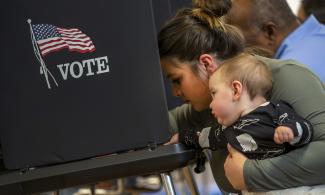
In Virginia, Rep. Elaine Luria, a Navy veteran who serves on the House committee investigating the Jan. 6 insurrection, was the first Democratic incumbent to lose a highly competitive House district, falling to former Navy helicopter pilot Jen Kiggans.
Republicans and Democrats were on Tuesday in a tight race for control of Congress and governors' offices with the outcome determining the future of President Joe Biden's agenda as polls closed across most of the country.
In Virginia, Rep. Elaine Luria, a Navy veteran who serves on the House committee investigating the Jan. 6 insurrection, was the first Democratic incumbent to lose a highly competitive House district, falling to former Navy helicopter pilot Jen Kiggans.
But Democratic Reps. Abigail Spanberger and Jennifer Wexton held off spirited Republican challengers in districts the GOP had hoped to flip, according to AP.
Florida Governor, Ron DeSantis and Texas Governor, Greg Abbott, two future possible Republican presidential contenders, beat back Democratic challengers to win reelection in the nation's two largest red states. For Democrat Beto O'Rourke, who lost to Abbott, it was his third failed campaign since 2018.
It is too early to say which party will be in charge of the Senate, which Democrats currently control by virtue of Vice President Kamala Harris' tiebreaking vote in the 50-50 chamber.
The outcome of races for House and Senate will determine the future of Biden's agenda and serve as a referendum on his administration as the nation reels from record-high inflation and concerns over the direction of the country. Republican control of the House would likely trigger a round of investigations into Biden and his family, while a GOP Senate takeover would hobble Biden's ability to make judicial appointments.
Democrats were facing historic headwinds. The party in power almost always suffers losses in the president's first midterm elections, but Democrats had been hoping that anger from the Supreme Court's decision to gut abortion rights might energise their voters to buck historical trends.
In Georgia, Democratic Sen. Raphael Warnock and Republican challenger Herschel Walker were vying for a seat that could determine control of the Senate.
Republicans are betting that messaging focused on the economy, gas prices and crime will resonate with voters at a time of soaring inflation and rising violence.
AP VoteCast, a broad survey of the national electorate, showed that high inflation and concerns about the fragility of democracy were heavily influencing voters.
Half of voters said inflation factored significantly, with groceries, gasoline, housing, food and other costs that have shot up in the past year. Slightly fewer - 44% - said the future of democracy was their primary consideration.
Overall, 7 in 10 voters said the ruling overturning the 1973 decision enshrining abortion rights was an important factor in their midterm decisions.
VoteCast also shows the reversal was broadly unpopular. About 6 in 10 say they are angry or dissatisfied by it, while about 4 in 10 were pleased. And roughly 6 in 10 say they favor a law guaranteeing access to legal abortion nationwide.
There were no widespread problems with ballots or voter intimidation reported around the country, though there were hiccups typical of most Election Days. Some tabulators were not working in a New Jersey county. In Philadelphia, where Democrats are counting on strong turnout, people complained about being turned away as they showed up in person to try to fix problems with their previously cast mail-in ballots.